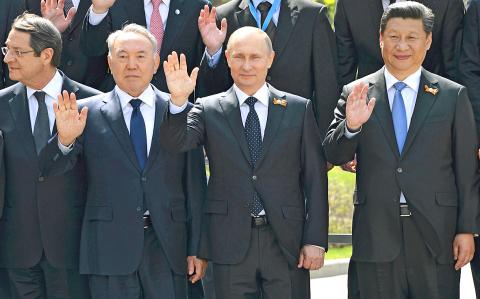China has invited Russian troops to march in a parade in Beijing in September to commemorate the end of World War II, the Chinese Ministry of Defense said yesterday, a move likely to further put off Western leaders from attending.
China has been coy about which nations it plans to invite to the parade, but said it would likely invite representatives from the Western allies who fought with China during the war.
However, Chinese President Xi Jinping (習近平) could be left standing with few top Western officials due to Western governments concerns over a range of issues, including the expected presence of Russian President Vladimir Putin, diplomats said.

Photo: Reuters
Xi on Saturday attended a parade in Moscow to mark 70 years since the end of the war in Europe.
A Chinese Ministry of Defense statement said that Chinese Central Military Commission deputy chairman Fan Changlong (范長龍) told Russian Minister of Defense Sergei Shoigu that China “warmly welcomes Russian military leaders and army formations” to take part in the September events in Beijing.
Xi’s visit to Russia and appearance at the Moscow commemorations “pushed the China-Russia all-round strategic partnership relationship to a new level,” Fan added, according to the statement.
Western leaders boycotted the Moscow parade over Russia’s role in the Ukraine crisis.
The Beijing parade, which is likely see troops marching through Tiananmen Square, is to be Xi’s first since he took over as Chinese Communist Party leader and military chief in late 2012 and as state president in early 2013.
Sino-Japan relations have long been poisoned by what China sees as Japan’s failure to atone for its occupation of parts of the nation before and during the war, and Beijing rarely misses an opportunity to remind its people and the world of this.
Last month, US President Barack Obama’s top Asia adviser, Evan Medeiros, said that he had questions about whether a large military parade would really send a signal of reconciliation or promote healing, drawing a rebuke from China.

MORE VISITORS: The Tourism Administration said that it is seeing positive prospects in its efforts to expand the tourism market in North America and Europe Taiwan has been ranked as the cheapest place in the world to travel to this year, based on a list recommended by NerdWallet. The San Francisco-based personal finance company said that Taiwan topped the list of 16 nations it chose for budget travelers because US tourists do not need visas and travelers can easily have a good meal for less than US$10. A bus ride in Taipei costs just under US$0.50, while subway rides start at US$0.60, the firm said, adding that public transportation in Taiwan is easy to navigate. The firm also called Taiwan a “food lover’s paradise,” citing inexpensive breakfast stalls

TRADE: A mandatory declaration of origin for manufactured goods bound for the US is to take effect on May 7 to block China from exploiting Taiwan’s trade channels All products manufactured in Taiwan and exported to the US must include a signed declaration of origin starting on May 7, the Bureau of Foreign Trade announced yesterday. US President Donald Trump on April 2 imposed a 32 percent tariff on imports from Taiwan, but one week later announced a 90-day pause on its implementation. However, a universal 10 percent tariff was immediately applied to most imports from around the world. On April 12, the Trump administration further exempted computers, smartphones and semiconductors from the new tariffs. In response, President William Lai’s (賴清德) administration has introduced a series of countermeasures to support affected

CROSS-STRAIT: The vast majority of Taiwanese support maintaining the ‘status quo,’ while concern is rising about Beijing’s influence operations More than eight out of 10 Taiwanese reject Beijing’s “one country, two systems” framework for cross-strait relations, according to a survey released by the Mainland Affairs Council (MAC) on Thursday. The MAC’s latest quarterly survey found that 84.4 percent of respondents opposed Beijing’s “one country, two systems” formula for handling cross-strait relations — a figure consistent with past polling. Over the past three years, opposition to the framework has remained high, ranging from a low of 83.6 percent in April 2023 to a peak of 89.6 percent in April last year. In the most recent poll, 82.5 percent also rejected China’s

PLUGGING HOLES: The amendments would bring the legislation in line with systems found in other countries such as Japan and the US, Legislator Chen Kuan-ting said Democratic Progressive Party (DPP) Legislator Chen Kuan-ting (陳冠廷) has proposed amending national security legislation amid a spate of espionage cases. Potential gaps in security vetting procedures for personnel with access to sensitive information prompted him to propose the amendments, which would introduce changes to Article 14 of the Classified National Security Information Protection Act (國家機密保護法), Chen said yesterday. The proposal, which aims to enhance interagency vetting procedures and reduce the risk of classified information leaks, would establish a comprehensive security clearance system in Taiwan, he said. The amendment would require character and loyalty checks for civil servants and intelligence personnel prior to